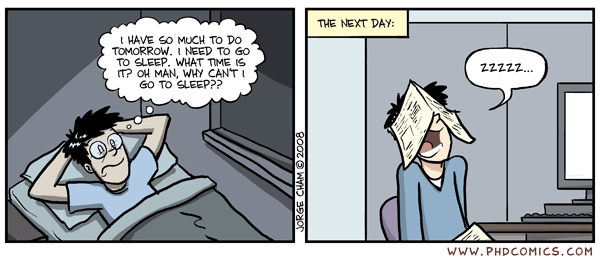"When do you find time to sleep!?" people often ask me. (I like to keep busy). My response is usually something like "Sleep finds time for me". Truly, since first year, my sleep schedule has become increasingly erratic. I find myself sleeping when [if] I have time, or when my body has just given up being awake and forces me into shutdown mode. Some weeks I get 8+ hours a night; others I'd be lucky to have 8 hours across the whole week. Sometimes I'm asleep by 10pm, other times I'm asleep by noon. This is not healthy.

Granted, we have no clue what sleep is for. Really. Scientists are baffled. But we don't need science to tell us that a lack of sleep and a sleep schedule is bad. It might sound okay to be able to flexibly sleep whenever the time arises, but it also means sometimes sleeping through classes, feeling unrested for tests, difficulties with concentration and memory, and other nasty things. (My friends are also getting tired of receiving "Good morning" Snapchat messages at 4pm on a Monday). In short: I need to start sleeping like a more regular person. Especially with midterms on the rise.
(Well, like a regular student anyway. I don't mind staying up late every now and then, but I can't let a nap from 2pm to 5pm on a Monday be my only sleep until Thursday).

So I've decided to take pro-active steps toward sleeping better. And who better to help than the scientists from MIT? Here are some of their tips I'll be following for the rest of the term.
- Avoid caffeine four to six hours before bedtime; eat dinner early. This can be hard when I've got a 6-9pm class I need to slog through, but I'll do my best to replace coffee and sodas with water and fruit, and to avoid snacking at midnight and beyond.
- Establish a pre-sleep routine. Guiltily, I don't have any regular routine around falling asleep, which is probably my problem. When I was young, I'd regularly fall asleep listening to golf playing on TV down the hall. Maybe I'll finally make good use of my radio.
- Keep your internal clock set with a regular sleep schedule. I don't think I've seen the words "regular sleep schedule" without an "ir-" in front. This is probably my worst sleep vice: sometimes I'm up all night and asleep during the day. I'll sleep during any hour on the clock, when I should be setting a window of time aside for sleep alone.
- Light affects your sleep patterns, so let light in first thing in the morning and get sun during the day. Admittedly, my blinds are usually closed to keep light out for the very reason that it helps me wake up when I want to sleep. But, if I want to get my schedule on track, I'll probably have to leave them open and deal with this notion of "morning". (And re-installing f.lux wouldn't be a bad idea either).
- Keep your bedroom for sleep and sex. Well, this one's a little more difficult because all I've got right now is a bedroom in a shared house: I do nearly everything in that room. But, while I can't designate my bedroom for those things alone, I can try and do more things outside my room: studying in offices and libraries, eating in the ever-vulnerable shared kitchen.
What about you? How do you manage to keep sleep on your side? Give me your tips in the comments below! (If I don't reply, I'm hopefully zzzzz)
0 comments on “Goodnight moon”